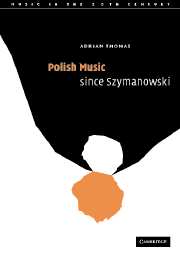Book contents
- Frontmatter
- Contents
- List of musical examples
- Preface
- Acknowledgements
- List of abbreviations
- Part I The captive muse
- Part II Facing west
- 6 The ‘Warsaw Autumn’
- 7 Engaging with the avant-garde
- Part III The search for individual identity
- Part IV Modernisms and national iconographies
- Part V Postscript
- Appendix 1 Cultural events in Poland, 1953–6
- Appendix 2 ‘Warsaw Autumn’ repertoire, 10–21 October 1956
- Appendix 3 ‘Warsaw Autumn’ repertoire, 1958–61
- Appendix 4 Selected Polish chronology (1966–90)
- Notes
- Select bibliography
- Index
6 - The ‘Warsaw Autumn’
Published online by Cambridge University Press: 22 September 2009
- Frontmatter
- Contents
- List of musical examples
- Preface
- Acknowledgements
- List of abbreviations
- Part I The captive muse
- Part II Facing west
- 6 The ‘Warsaw Autumn’
- 7 Engaging with the avant-garde
- Part III The search for individual identity
- Part IV Modernisms and national iconographies
- Part V Postscript
- Appendix 1 Cultural events in Poland, 1953–6
- Appendix 2 ‘Warsaw Autumn’ repertoire, 10–21 October 1956
- Appendix 3 ‘Warsaw Autumn’ repertoire, 1958–61
- Appendix 4 Selected Polish chronology (1966–90)
- Notes
- Select bibliography
- Index
Summary
Within a year of Stalin's death, there were flickering signs of moderation in Polish culture. The eleventh session of the Council of Culture and Art (15–16 April 1954) was one turning point. Mycielski, for example, raised the issue of conflict between artistic truth and ideology:
Crusading art is art against the established order of things … On the other hand the art of an ideology, which has triumphed and reached power, must fight in another way … But then we – in order not to damage the building, in order not to give our foes material for their propaganda … – we place on the writer a kind of bridle so that he either resigns, or becomes cynical, or falls silent, or writes apologetic or panegyric works. He does not, however, present living truth, as he sees and feels it …
According to Panufnik, Sokorski (who had been promoted to head the Ministry of Culture a while earlier) had allowed the impression to develop before the Council met that there might be some changes in the air. At one point in his speech, Sokorski admitted that ‘[the] underestimation of form … the relinquishing of innovations … are conducive … to trivial, unaesthetic works … Socialist realism is neither a definite artistic school, nor a definite style, nor a recipe.’ There was little argument on that score, but elsewhere in his speech Sokorski dashed any hope of real change and reiterated the standard Party position.
- Type
- Chapter
- Information
- Polish Music since Szymanowski , pp. 83 - 91Publisher: Cambridge University PressPrint publication year: 2005



